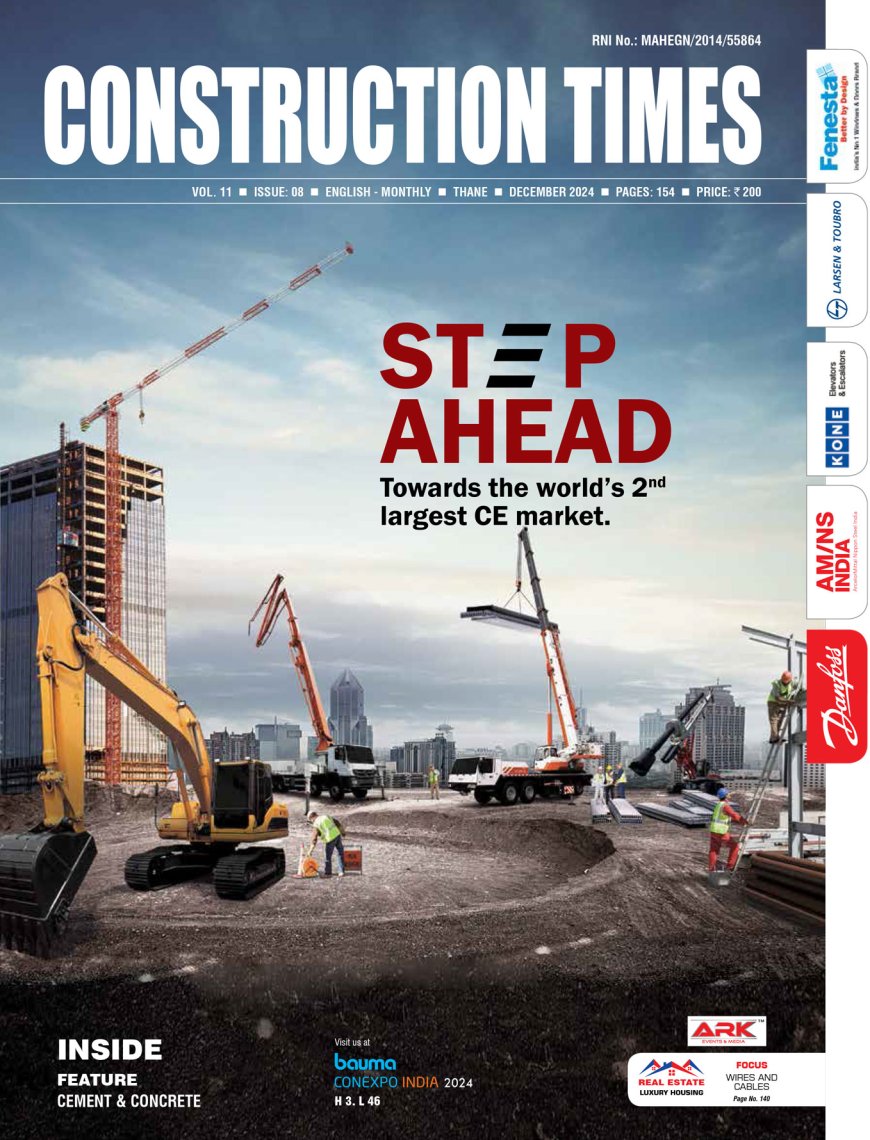Anil Ghegade
Senior Director, Danfoss India Innovation Center
What is the current market scenario of Indian construction equipment industry?
The Indian construction equipment industry is currently experiencing significant growth, driven by both government initiatives and private sector investments. The economy needs reliable infrastructure to connect supply chains and efficiently move goods and services across country. India is still under-developed, but it is expected to continue to invest, which will increase demand for construction equipment.
Several key factors are shaping the market today:
Government infrastructure push: With the government’s ambitious infrastructure plans, such as the National Infrastructure Pipeline (NIP) and initiatives like PM Gati Shakti, we are seeing an unprecedented level of investment in infrastructure. These projects are creating substantial demand for construction equipment in driving efficiency and timely completion of projects.
Technological advancements: Technological adoption is accelerating in the sector. We are seeing a rise in the use of telematics and GPS-enabled machinery, which offers real-time data for monitoring performance and improving productivity. Additionally, there is a growing shift towards environmental concerns and cost efficiency, as fuel prices continue to rise.
Growth of equipment rentals: The rise of the construction equipment rental market is also noteworthy. Many small and medium-sized enterprises are increasingly opting for rental equipment to avoid high capital costs and to ensure they have access to the latest, most efficient machines without the long-term financial burden.
Rising demand in key segments: Earthmoving equipment, like backhoe loaders and excavators, continues to dominate the market, driven by large-scale infrastructure projects. Road construction equipment, particularly asphalt pavers, road rollers, and milling machines, are also in high demand due to the government’s focus on highway expansion.
Globalization and export potential: India is not only a key player in the domestic market but also emerging as an important exporter of construction machinery. The demand for cost-effective yet reliable construction equipment is growing in emerging markets in Southeast Asia, Africa, and the Middle East.
How do you look at the progress of Make in India initiatives in construction equipment and components?
The 'Make in India' initiative has been a game-changer for various industries, and the construction equipment sector is no exception. In the construction equipment industry, this initiative has catalyzed investment in manufacturing plants, R&D, and technology adoption. We are seeing a shift toward localized production of both equipment and components, which is not only improving supply chain resilience but also making the sector more competitive globally.
At Danfoss, we have been strong advocates for the 'Make in India' initiative, particularly in the construction equipment sector, where we provide essential hydraulic components that are integral to modern machinery. Here is how we are contributing:
Local manufacturing and R&D: Danfoss has significantly expanded its local manufacturing footprint in India. Our state-of-the-art facilities in Pune are not only a key hub for producing high-performance components like variable displacement pumps, motors, and valves, but also for driving R&D efforts tailored to the specific needs of the Indian market.
Technology leadership: Danfoss is pushing the boundaries of hydraulics to make construction equipment more efficient, reliable, and environmentally friendly. Our energy-efficient solutions are designed to improve fuel efficiency and reduce emissions, supporting the sustainability goals while aligning with the 'Make in India' vision.
Partnering with OEMs: We work closely with leading Indian OEMs in the construction sector to supply custom-built components that integrate seamlessly with their equipment. By providing localized solutions, we enable our partners to improve their competitiveness in both the domestic and export markets.
Sustainability and smart solutions: Danfoss is not just focused on local manufacturing but also on advancing smart and green technologies. Our solutions help make construction equipment more fuel-efficient and environmentally friendly.
According to you, how important is enhancing the local manufacturing of components and aggregates in India?
The construction sector is a cornerstone of India’s infrastructure development, and the growth of this sector heavily depends on the availability and affordability of high-quality components and aggregates. Local manufacturing plays such a vital role for: cost efficiency and price competitiveness, supply chain resilience and agility, quality and customization, fostering innovation and technological advancement, and sustainability goals.
What is your vision on India becoming the second-largest CE market globally?
India’s rise to being the third-largest construction equipment market globally is a remarkable achievement and speaks volumes about the growth of the country's infrastructure and construction sectors. As we look ahead, I firmly believe that India has the potential to become the second-largest CE market globally, driven by several factors that are already in motion today.
Continued infrastructure growth: India’s ambitious infrastructure development agenda is a key driver of the construction equipment market. The government’s focus on road construction, urban infrastructure, and industrial corridors will continue to fuel demand for construction machinery.
Technological advancements and industry innovation: The global shift toward smart, fuel-efficient, and environmentally friendly construction equipment is driving the demand for more advanced machines. India is rapidly adopting these technologies, with increased awareness of telematics, automation, and electric machinery.
Investment in sustainability: India’s commitment to sustainability and reducing the carbon footprint of construction activities is driving the shift toward green technologies in the construction equipment sector. This includes electric, hybrid, and energy-efficient machinery.
What are your expansion plans in CE components manufacturing in the coming years?
At Danfoss, we recognize the significant opportunities that lie ahead in the Indian market, and our expansion plans are closely aligned with the broader trends in the construction equipment sector. Here is a closer look at our approach and the key areas we are focusing on in the coming years:
Enhancing local manufacturing capabilities: As the demand for construction equipment continues to surge, particularly with large-scale government infrastructure projects, our focus is on significantly enhancing our local manufacturing capabilities. We plan to scale up production in our existing facilities while also opening a new green field manufacturing plant in strategic product needs.
Strengthening R&D and product development: We are committed to driving innovation in construction equipment components and expanding our research and development capabilities is a key priority. Our goal is to develop products that are tailored to the specific needs of the Indian market while also being aligned with global technological advancements. This includes:
Customization for local needs: Our R&D efforts will also focus on developing components that are tailored to Indian operating conditions, such as high temperature, rugged terrains, and varying soil conditions. Localized solutions will ensure better performance and reliability of construction equipment in the Indian market.


















